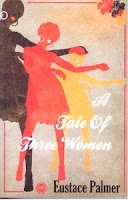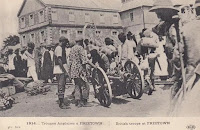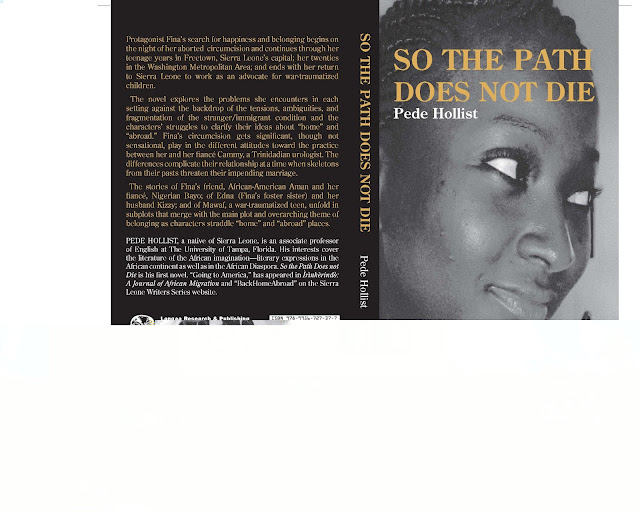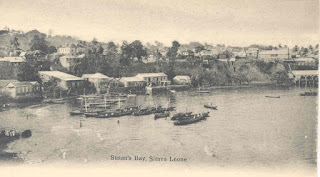Vitabubooks Interview | Eustace Palmer, Novelist and Book Critic
Sierra Leonean-born Eustace Palmer is English Professor and Africana Studies coordinator at Georgia College & State University. Palmer received a Master of Arts with honors in English Language and Literature and a Ph.D. in 18th Century English Literature from The University of Edinburgh. Returning to his native West Africa, he taught at Fourah Bay College, University of Sierra Leone, rising through the ranks to become a full professor and chair of the English Department. While teaching at Fourah Bay, he became one of the pioneer critics of African literature and published four books on the subject: An Introduction to the African Novel; The Growth of the African Novel; Of War and Women, Oppression and Optimism: New Essays on the African Novel; and Knowledge Is More Than Mere Words: A Critical Introduction to Sierra Leonean Literature (jointly edited with Abioseh Michael Porter). He has also published over 60 articles on English and African literatures. He was an associate editor of African Literature Today for several years and was president of the African Literature Association from 2006 to 2007. A Tale of Three Women is his first published novel.
Here's a brief description as seen on the Africa World Press, Inc. & The Red Sea Press, Inc. page
Set in Sierra Leone, West Africa, A Tale of Three Women is epic in scope, covering a span of about sixty years and touching upon the most important developments in that country's recent history from about 1918 to the 1970s. It encompasses events such as the worldwide influenza epidemic, the Second World War, the preparation for independence, the achievement of independence, and the post-independence malaise. But all these serve only as a background against which Eustace Palmer deftly weaves the experiences of three very different women.
Vitabu Books: In an interview with Gibril Koroma last year you said
As Africans, we have to be interested in African literature because it is our own literature. It is the literature that chronicles our own experiences and the forces that make up our environment.You also said that as a critic of African literature, you consider it your responsibility to mediate that literature primarily for African readers and to show how [it] reflects their experiences and environment. You've just published a new novel A Tale of Three Women have you moved away from your role of being a critic of African literature?
Eustace Palmer: In becoming a creative writer, I have not moved away from my role as a critic of African literature. In fact, I had been working on the novels—three have already come out and one will be coming out shortly—for the last ten years or so, making revisions on them in light of the suggestions of reviewers. So the creative process was going on at the same time as the major critical process, that is while I was working on my most recent critical works Of War and Women, Oppression and Optimism and Knowledge is More than Mere Words, as well as writing papers for conferences. I just decided at the beginning of last year that it was time I got the novels off my hands. I do not see why we must assume that the creative and critical imaginations must be kept absolutely separate. After all, some of the greatest literary critics, like John Dryden, Dr. Samuel Johnson and T.S.Eliot, have also been great creative writers. I admit that being committed to the critical practice might inhibit creativity, but it does not necessarily follow. Nowadays it is becoming common for teachers and critics of literature to be also practicing poets or dramatists or even novelists.
Vitabu Books: In GK's interview, you also spoke of the handicap African publishing has to overcome. You said, "We must try to introduce standards of integrity and professionalism into our publishing endeavors, the same kind of standards that Western writers have come to expect from their publishers." Can you comment further.
Eustace Palmer: It is becoming increasingly difficult, for all kinds of reasons, for African writers to find publishers in the Western world, as was the case during the dawn of modern African literature with writers like Achebe, Laye, Soyinka and so on. Indeed, I do not really think that it is all that desirable for African writers to be published in the Western world. For one thing, it will mean that Western arbiters will determine the taste and direction of African writing, rather than Africans. Increasingly, therefore, I feel African writers should be published within Africa itself.
One reason for this is that this will make these works more accessible to the African audience for whom they were (presumably) written. In any case, these works should be read by Africans because they are about the African environment and could play a part in the process of reconstructing African society. This means that we must find African publishers, but African publishers (there are some exceptions of course) sometimes lack the marketing skills to publicize the works, and some of them do not always keep accurate records to enable them to give accurate feedback (financial and otherwise) to their writers. This is something we must work on. I speak from experience. It will be most unfortunate if, after taking the trouble to write their books, African writers do not get any feedback about how well the books are doing or do not get any royalties at all, even though they may have learned from the grapevine that the books have reached the targeted audience.
Vitabu Books: How is the African Literature Association project that is foregrounding Sierra Leonean literature coming along?
Eustace Palmer: The project is going very well indeed. In fact, one of the books I published recently Knowledge Is More Than Mere Words: A Critical Introduction to Sierra Leonean Literature, jointly edited with Professor Abioseh Porter of Drexel University is a result of this project, since it brought together essays on Sierra Leonean literature written by scholars of Sierra Leonean extraction who, as part of the project, had been conducting research into Sierra Literature and discussing the results of their research at conferences of the African Literature Association.
For the past several years, we have had panels on Sierra Leonean literature at the conference, and in some years we have had two panels. We will certainly be having at least one panel at the forthcoming conference at Ohio University, in Athens, Ohio. There is already a feeling that there is need for a sequel to Knowledge is More Than Mere Words, because quite a few writers, like Aminatta Forna and Delia Jarrett-Macauley, have come to the fore.




Comments
Post a Comment